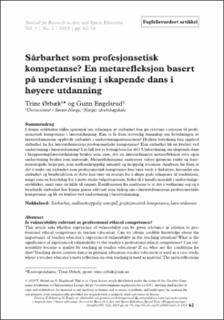| dc.contributor.author | Ørbæk, Trine | |
| dc.contributor.author | Engelsrud, Gunn Helene | |
| dc.date.accessioned | 2020-05-04T09:28:56Z | |
| dc.date.available | 2020-05-04T09:28:56Z | |
| dc.date.created | 2019-12-17T08:50:24Z | |
| dc.date.issued | 2019 | |
| dc.identifier.citation | Journal for Research in Arts and Sports Education. 2019, 3(2), 62-76. | en_US |
| dc.identifier.issn | 2535-2857 | |
| dc.identifier.uri | https://hdl.handle.net/11250/2653165 | |
| dc.description | This is an Open Access article distributed under the terms of the Creative Commons Attribution 4.0 International License (https://creativecommons.org/licenses/by-nc/4.0/), allowing third parties to copy and redistribute the material in any medium or format and to remix, transform, and build upon the material for any purpose, even commercially, provided the original work is properly cited and states its license. | en_US |
| dc.description.abstract | This article asks whether experience of vulnerability can be given relevance in relation to professional ethical competence in teacher education: Can we obtain credible knowledge about the importance of teacher educator’s experienced vulnerability in the teaching situation? What is the significance of experienced vulnerability to the teacher’s professional ethical competence? Can vulnerability become a quality by teaching in teacher education? If so, what are the conditions for that? Teaching about creative dance in physical education teacher education is used as a case study, where a teacher educator’s meta reflection on own teaching is used as material. The meta reflections are further analyzed through ethical and phenomenological concepts, such as intercorporeality and bodily resonance. The analysis shows that thinking about vulnerability as a professional ethical competence can be worth discussing; including how vulnerability and understanding of this can be a resource for creating good relationships with students; as part of a readiness to meet ethical choices; helping to act morally in the teaching situation, and being a source of empathy. Conclusions from the analyzes are that acknowledging and processing vulnerability should be made relevant as a contribution to the teacher educator’s professional ethics competence and become a quality through teaching teacher education. | en_US |
| dc.language.iso | nob | en_US |
| dc.subject | vulnerability | en_US |
| dc.subject | embodied interaffectivity | en_US |
| dc.subject | professional ethical competence | en_US |
| dc.subject | teacher educator | en_US |
| dc.title | Sårbarhet som profesjonsetisk kompetanse? En metarefleksjon basert på undervisning i skapende dans i høyere utdanning | en_US |
| dc.type | Peer reviewed | en_US |
| dc.type | Journal article | en_US |
| dc.description.version | publishedVersion | en_US |
| dc.rights.holder | © 2019 T. Ørbæk og G. Engelsrud. | en_US |
| dc.source.pagenumber | 62-76 | en_US |
| dc.source.volume | 3 | en_US |
| dc.source.journal | Journal for Research in Arts and Sports Education | en_US |
| dc.source.issue | 2 | en_US |
| dc.identifier.doi | 10.23865/jased.v3.1456 | |
| dc.identifier.cristin | 1761598 | |
| dc.description.localcode | Seksjon for kroppsøving og pedagogikk / Department of Physical Education | en_US |
| cristin.unitcode | 150,35,0,0 | |
| cristin.unitname | Seksjon for kroppsøving og pedagogikk | |
| cristin.ispublished | true | |
| cristin.fulltext | original | |
| cristin.qualitycode | 1 | |
